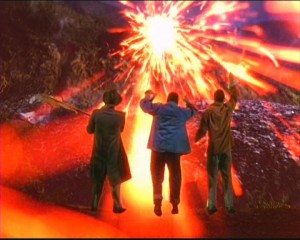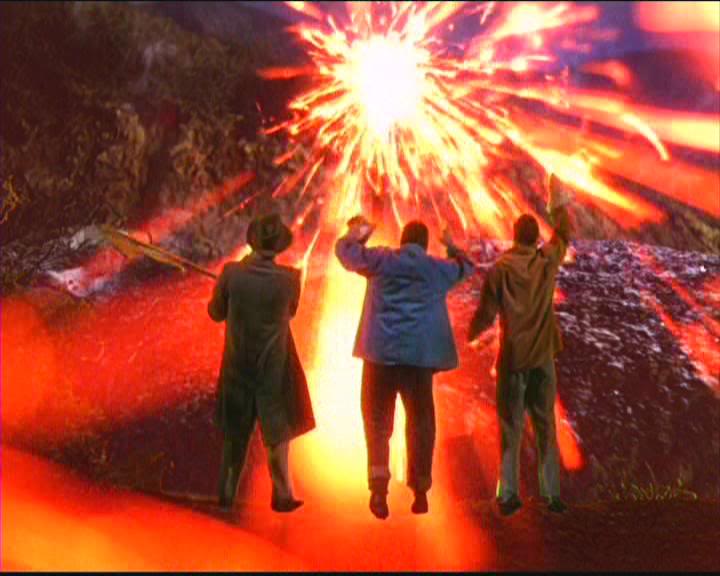The 1950s film version of H. G. Wells’s The War of the Worlds is the best version of all.
The War of the Worlds
Paramount Pictures, 1953, 85 minutes.
Producer: George Pal. Director: Byron Haskin.
Cast: Gene Barry, Ann Robinson, Les Tremayne, Bob Cornthwaite, Sandro Giglio, Lewis Martin, Jack Kruschen. Narration: Sir Cedric Hardwicke.
Inspired by the 1898 H. G. Wells novel.
“Don’t fool around with something when you don’t know what it is.”
—Wisdom for the ages from this film, spoken by Jack Kruschen
 A surprisingly perceptive reviewer at The New York Times assessed George Pal’s rendition of H. G. Wells’s story when the film first hit the screens back in ’53:
A surprisingly perceptive reviewer at The New York Times assessed George Pal’s rendition of H. G. Wells’s story when the film first hit the screens back in ’53:
Make no mistake about it, science-fiction, like comic books, is a part of our culture, and George Pal, who produced this latest amalgam of fact and fantasy, is no tyro in this field. Like his previous sorties into interplanetary space—”Destination Moon” and “When Worlds Collide”—”The War of the Worlds” is, for all of its improbabilities, an imaginatively conceived, professionally turned adventure, which makes excellent use of Technicolor, special effects by a crew of experts and impressively drawn backgrounds.
Equally important is the fact that Director Byron Haskin, working from a tight script by Barre Lyndon, has made this excursion suspenseful, fast and, on occasion, properly chilling.
You’ll seldom find those attributes in today’s overblown special-effects extravaganzas. As for
the invaders—they’re frightening, spindly, anemic, one-eyed creatures . . .
. . . that are refreshingly alien aliens. The Martians, however, have some surprises up their, uh, sleeves when astonished Earthmen see that
the nest of Martian machines hovering over the area on electronic beams they send out, also have an “invisible electronic umbrella,” which protects them against the [atomic] bomb. This, of course, brings on a wave of terror with people stampeding from Los Angeles as the monstrous creations start leveling the city before taking over and completing their migration.
Considering how dangerous these illegal aliens are, would they accept an amnesty deal? A local minister thinks the invaders might be willing to parley—but is severely disappointed by their response:
As noted by Caroline Blake, the film is very different from the original novel in its attitude toward religion, as reflected especially in the depiction of clergymen as characters: “The staunchly secularist Wells depicted a cowardly and thoroughly uninspiring Curate, whom the narrator regards with disgust, with which the reader is invited to concur. In the film there is instead the sympathetic and heroic Pastor Collins who dies a martyr’s death. And then the film’s final scene in the church, strongly emphasizing the Divine nature of Humanity’s deliverance, has no parallel in the original book.“
It’s highly significant, I think, that the good pastor’s cold-blooded murder is all the human defenders need to start shooting—but will it be enough?
Does our side win despite these odds? Of course. But it would be unfair, even to a Martian, to divulge the climax. Gene Barry, as the scientist, and the rest of the cast behave naturally, considering the circumstances. As might be expected, however, the cast and even Sir Cedric Hardwicke and his voice of doom narration play second fiddle to the intricate and ominous Martian craft. Mind those heat rays!
A sci-fi epic, a horror flick, a love story, even that rare item, a Hollywood movie which has positive things to say about religion—George Pal’s version of The War of the Worlds is all of these, earning our recommendation.


